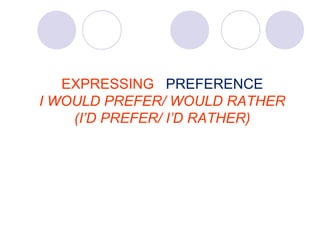
PREFERENCE (I PREFER/ I WOULD RATHER)
- 1. EXPRESSING PREFERENCE I WOULD PREFER/ WOULD RATHER (I’D PREFER/ I’D RATHER)
- 2. EXPRESSING PREFERENCE I WOULD PREFER/ WOULD RATHER I never take the bus. I prefer to walk/walking . It’s late. I’d prefer to turn back. I WOULD RATHER+INF (sin TO) It’s late. I’d rather turn back.I never take the bus. I’d rather walk .
- 3. 1. I don’t save money. I prefer to spend/spending it. (general preference) 2. I don’t want to go out tonight. I’d prefer to stay in. (particular preference) - Structure WOULD PREFER has TO+ INFINITIVE - Structure WOULD RATHER has INFINITIVE WITHOUT TO. I’d prefer to leave now I’d rather leave now. EXPRESSING PREFERENCE I WOULD PREFER/ WOULD RATHER
- 4. Read this example: 1. I don’t like this hotel. I would have preferred to go to an appartment. - Can the situation change? No, because the action is done (PAST TIME) - Does the sentence have an OBJECT? No, the subject is the same for both actions. Read these examples: what’s the diference? a. I’d prefer YOUR MOTHER/HER to come another day. b. I’d prefer YOUR MOTHER/HER to have come another day. In a., the action has not happened yet. (present) In b, this action has happened. (past) - Does the sentence has an object? Yes. YOUR MOTHER/HER (direct complement) EXPRESSING PREFERENCE I WOULD PREFER/ WOULD RATHER IN THE PAST
- 5. I didn’t like Delhi. I’D HAVE PREFERRED TO GO to Rome. WE lost the match. I’d HAVE PREFERRED YOU TO HAVE PLAYED with us.
- 6. The last examples: I’d prefer YOUR MOTHER/HER to come another day. I’d prefer YOUR MOTHER/HER to have come another day. Can be expressed with another sructure: I’d prefer IT IF your mother CAME another day. (2nd CONDITIONAL) I’d prefer IT IF your mother HAD COME another day. (3rd CONDITIONAL) In both cases, we use two conditionals, the 2nd and 3rd respectively. EXPRESSING PREFERENCE I WOULD PREFER/ WOULD RATHER
- 7. I’d rather that she CAME in my car. I’d rather that she HAD COMNE in my car.
- 8. CHANGE THESE EXAMPLES USING the structure WOULD RATHER + inf: 1. I’d prefer to leave now 2. I’d prefer your mother to come another day. 3. I’d prefer your mother to have come another day. ANSWERS 1. I’d rather leave now. 2. I’d rather (THAT) your mother CAME anoher day (object + simple past) 3. I’d rather (THAT) your mother HAD COME another day (object + past perfect) EXPRESSING PREFERENCE I WOULD RATHER+inf. Without to
- 9. USE OF ENGLISH, PART 4: WISH AND REGRET, ADVICE AND PREFERENCE.
- 10. 1. I’d love to know how John is getting on. KNEW I……………………………………………………….how John was getting on. 2. You should take an umbrella with you. BETTER You…………………………………………………………..an umbrella with you. 3. I think taxes should be increased. TIME It ……………………………………………………………….increased. 4. It was wrong of you to say that SHOULDN’T You………………………………………………………that. 5. I regret not visiting the Vatican when I was in Rome. ONLY If ……………………………………………………Vatican when I was in Rome. WISH I KNEW HAD BETTER TAKE IS TIME TAXES WERE SHOULDN’T HAVE SAID ONLY I HAD VISITED USE OF ENGLISH, PART 4 (1-5)
- 11. 1. I’d prefer you to get home early tonight. RATHER I………………………………………………………home early tonight. 2. It’s a pity the car is so expensive. WISH I…………………………………………………………………..so expensive. 3. I couldn’t post the letter yesterday and now it is too late. WISH I……………………………………………………the letter yesterday. 4. I don’t want to do something as dangerous as that PREFER ………………………….…………………something as dangerous as that. USE OF ENGLISH, PART 4, 1-4 ‘D RATHER YOU GOT WISH THE CAR WAS/WERE NOT WISH I HAD POSTED WOULD/’D PREFER NOT TO DO
- 12. IF ONLY/ I WISH 1. IF ONLY I ……………………………………………..THE ANSWER NOW FIND 2. IF ONLY I ……………………………………………….THE BOSS YESTERDAY TALK 3. I WISH IT………………………………………………..SO LATE. I DON´T WANT TO LEAVE. BE 4. I WISH I……………………………………………………MY HOMEWORK YESTERDAY. TODAY I CAN’T. DO USE OF ENGLISH, PART 4. FOUND HAD TALKED WEREN’T HAD DONE
- 13. 1. I’D RATHER YOU…………………………………………………THAT TERRIBLE BOY! NOT LOVE 2. I’D RATHER HE……………………………………………………….TO THE THEATRE WITH ME THIS SATURDAY COME 3. I’D RATHER WE …………………………………………………..THE MUSEUM LAST WEEK. VISIT USE OF ENGLISH, PART 4. DIDN’T LOVE CAME HAD VISITED
- 14. 3. I don’t want to do something as dangerous as that PREFER I ………………………….……………………………………………………….SOMETHING AS DANGEROUS AS THAT 4. The doctors say hat she will recover from the illness in about three weeks TAKE The doctors say that……………………………………………………………………………………three weeks to recover from the illness. 5. After a few minutes the interview was over and I left. LASTED The interview…………………………………………………………………………….and I left. WOULD/’D PREFER NOT TO DO IT WILL TAKE HER LASTED (FOR) A FEW MINUTES USE OF ENGLISH, PART 4. REVISION – FRI 11
- 15. 1. You don’t listen and that’s why you make so many mistakes COMMIT IF only ………………………….…………………………………………….so many mistakes 2. I should not have spent all my money in those shoes. WISH I…………………………………………………………………all that money in those shoes. 3. I’m not happy that they phoned me so late at night. RATHER I………………………………………………………………………………………………..called me so late at night. YOU DIDN’T COMMIT WISH I HADN’T SPENT WOULD/’D RATHER THEY HADN’T USE OF ENGLISH, PART 4. REVISION – FRI 11